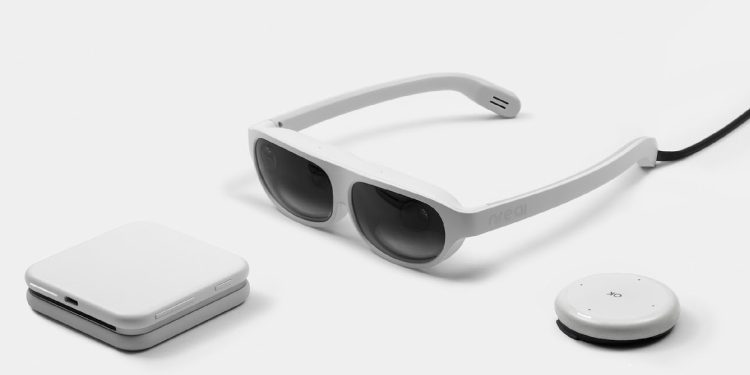Thanks to an impressively lightweight design and aggressive pricing, the Nreal Light AR glasses were poised to be among 2019’s most significant mixed reality hardware releases. Unfortunately, the Beijing-based developer now says the $500 consumer version won’t go on sale until early 2020, though customers across China may be able to test the hardware before that.
On its website, Nreal notes that the $1199 Light Developer Kit began shipping in late September of this year, offering early access to the glasses, a puck-like touch and haptic controller, a “computing unit” with a Qualcomm Snapdragon 845 processor inside, and a USB-C power adapter. By comparison, the $499 Consumer Kit will be “available for sale in early 2020,” apparently including only the USB-C-compatible glasses.
Nreal’s strategy is to leverage the horsepower and sensors found in Snapdragon-based Android phones to do the heavy processing work for the glasses. While the glasses will have their own 6DoF tracking system with SLAM mapping, plane detection, and image tracking, they’ll require the USB-C connection to supply their 1080p, 52-degree field of view Lightguide display with visual content. Qualcomm offered limited demos with Nreal at an event last month.
The good news is that Nreal has won the full support of Chinese cellular carrier China Unicom, which says it will use Light to show off AR and VR applications across 400 of its retail locations. For the technology-focused China Unicom, Nreal Light offers a tangible way to show off 5G mixed reality services that are about to become available in the country, which is presently in the process of rolling out early 5G networks across major cities.
“We’re excited to partner with China Unicom and take the next step in accelerating the commercialization of our product,” said Nreal CEO Chi Xu. “We’re thrilled to be paving the road to showcase the unlimited potential that 5G can offer consumers.”
Nreal appeared to be racing from relative obscurity to the global consumer market after an impressive debut at January’s CES in Las Vegas. But the company was sued earlier this year by rival Magic Leap, which accused Xu and Nreal of leveraging confidential Magic Leap information to create a competitive product. Magic Leap’s headset is considerably larger, heavier, and more expensive than Nreal Light, and thus far targeted solely at developers and “creators.” It’s unclear when the $2,295 Magic Leap One will see a more affordable sequel, but a future version with cellular support has reportedly been in the works for over a year, in partnership with U.S. carrier AT&T.
Updated 6:20 a.m. Pacific on October 18: An Nreal representative tells VentureBeat that the company previously planned to ship only “a very limited run” of consumer units in 2019 as a test batch before commencing “mass shipping” in 2020. As such, the company suggests, the date hasn’t changed for most consumers. Regardless, if you had hoped to buy an Nreal Light consumer kit, you can now expect it at some point in early 2020.

